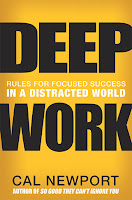
 Last week I said I was going to consider whether the concept of “deep work” could have any connection to “slow work.” Slow work, to the best of my knowledge,
seems to be more about dealing with spiritual issues and slowing down to
enjoy life rather than slowing down a work pace as a way to work more
efficiently and do more, which would make me enjoy life a whole lot more. Deep work, a term coined by Cal Newport, a computer science professor at Georgetown University, is a "skill that allows you to quickly master complicated information and produce better results in less time."
Last week I said I was going to consider whether the concept of “deep work” could have any connection to “slow work.” Slow work, to the best of my knowledge,
seems to be more about dealing with spiritual issues and slowing down to
enjoy life rather than slowing down a work pace as a way to work more
efficiently and do more, which would make me enjoy life a whole lot more. Deep work, a term coined by Cal Newport, a computer science professor at Georgetown University, is a "skill that allows you to quickly master complicated information and produce better results in less time."Okay, "quickly" seems as if it shouldn't have anything to do with "slow," but if producing "better results in less time" ends up meaning putting in fewer hours, that's slowing down as far as I'm concerned. Also, Newport is writing about working in an "information economy" or "new economy." He's not writing about writing.
But I've found my best time management ideas in books that were about managing other kinds of work.Therefore, I have a copy of Newport's book Deep Work: Rules for Focused Success in a Distracted World. A summer read is something I think I can manage while continuing to recover from an elder's most recent health crisis. And if it leads to better use of whatever I have for work time when I start living the new normal, boolyah!
An Introduction To Deep Work
In Newport’s introduction to his book, he defines deep work as "Professional activities performed in a state of distraction-free concentration that push your cognitive capabilities to their limit. These efforts create new value, improve your skill, and are hard to replicate." Examples for writers would be...ah...writing. Creating new content.
Deep work sounds like working in flow. Hmm. Unless flow states are used in order to work deep. One leads to another?
Newport argues that most “most modern knowledge workers” are “rapidly forgetting the value of going deep.” The reason? “Network tools.” By which he means, among other things, the social media that has become part of writers’ work, now that we do a big chunk of our own marketing. This type of work Newport calls “shallow work."
He describes shallow work as "Noncognitively demanding, logistical-style tasks, often performed while distracted. These efforts tend to not create much new value in the world and are easy to replicate." Examples for writers would be growing a Twitter following, promoting books on Twitter, maintaining a presence on Goodreads, etc.
Shallow work is the enemy of deep work. "...fragmented attention cannot accommodate deep work, which requires long periods of uninterrupted thinking.”
So far, none of this is really news. In fact, Newport says that, himself. His more original argument is that as our culture shifts toward spending more and more time in the shallows, opportunities exist for the people who are capable of working deep. Because there aren't that many of them.
Think of this in terms of writing. For writers, marketing is the shallows. It doesn't require the kind of depth that producing new content does. (For professional marketers, this may not be the case. Marketing may be their deep work, at least coming up with new marketing ideas.) I know one writer who has been writing successfully for many years describe how the percentage of time she spends writing has gone down, as she's had to spend more and more time promoting herself. I know of another writer who felt her first book sold, in part, because the publisher believed she had the marketing skills and drive to promote it. This is a case of a writer being rewarded for being good at shallow work or at least spending time doing it.
Nonetheless, no matter how good we are at the shallow stuff at some point we have to go deep enough to generate some content. Without the deep work, there's no need for the shallow work.
More to follow.
No comments:
Post a Comment